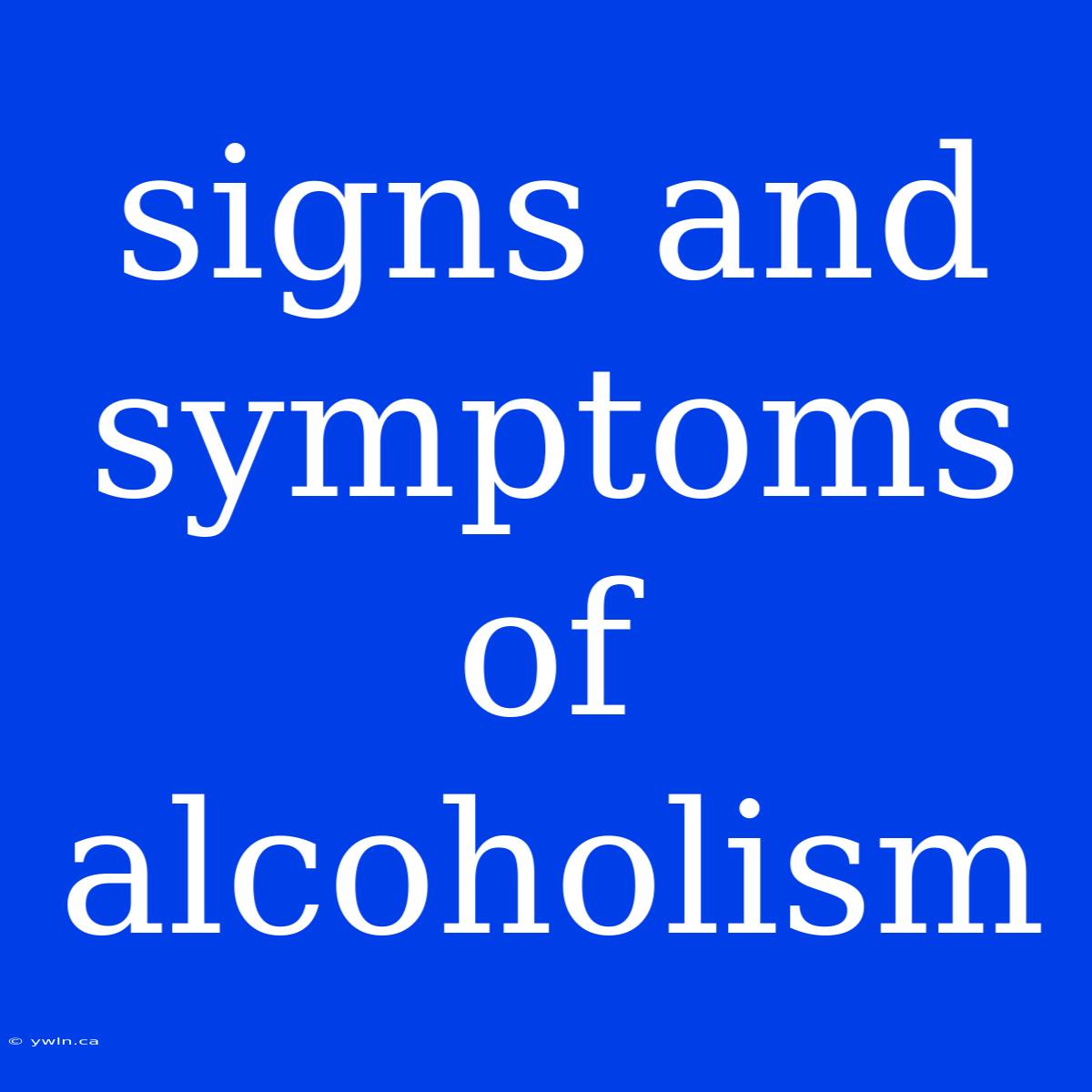Unmasking the Hidden Face of Alcoholism: Recognizing the Signs and Symptoms
Is alcoholism merely a matter of "having a few drinks too many?" The reality is far more complex. Alcoholism, also known as alcohol use disorder, is a chronic disease characterized by an inability to control alcohol consumption despite negative consequences. Recognizing the signs and symptoms of alcoholism is crucial for both individuals struggling with the disease and those around them. This comprehensive guide aims to shed light on the multifaceted nature of alcoholism and provide valuable insights for early detection and support.
Editor Note: Understanding the signs and symptoms of alcoholism is vital, not just for individuals facing the disease, but also for families, friends, and colleagues. Early identification can make a crucial difference in seeking help and fostering recovery. This article delves into the often-overlooked aspects of alcoholism, providing a thorough analysis of its complexities.
Analysis: This guide combines research from medical journals, case studies, and expert opinions to provide a comprehensive overview of alcoholism. We have carefully examined the various signs and symptoms, both physical and behavioral, to create a clear and informative resource for better understanding this complex condition.
Key Takeaways
| Category | Signs and Symptoms |
|---|---|
| Physical | Changes in sleep patterns, tremors, loss of coordination, red eyes, facial flushing, frequent colds |
| Behavioral | Social withdrawal, neglecting responsibilities, changes in mood, risky behavior, blackouts, craving alcohol |
| Psychological | Anxiety, depression, low self-esteem, difficulty concentrating, memory problems, guilt, shame, denial |
Understanding the Spectrum of Alcoholism
The severity of alcoholism can range from mild to severe, with the presence and intensity of signs and symptoms varying accordingly.
Physical Signs and Symptoms
- Changes in Sleep Patterns: Alcohol disrupts the sleep-wake cycle, leading to insomnia, frequent awakenings, and excessive daytime sleepiness.
- Tremors: Shaking hands, especially in the morning, can be a telltale sign of alcohol withdrawal.
- Loss of Coordination: Difficulty walking, slurred speech, and clumsiness are often associated with alcohol consumption.
- Red Eyes and Facial Flushing: Alcohol dilates blood vessels, causing red eyes and a flushed face, particularly after drinking.
- Frequent Colds: Alcohol weakens the immune system, making individuals more susceptible to colds and infections.
Behavioral Signs and Symptoms
- Social Withdrawal: An alcoholic may avoid social gatherings or activities where alcohol is present.
- Neglecting Responsibilities: Work, school, or family obligations are often ignored or poorly managed.
- Changes in Mood: Rapid mood swings, irritability, and outbursts of anger are common.
- Risky Behavior: Driving under the influence, engaging in unsafe sex, or engaging in other risky behaviors.
- Blackouts: Memory gaps during or after drinking are a significant indicator of alcohol abuse.
- Craving Alcohol: An intense urge to drink, even after promising to abstain.
Psychological Signs and Symptoms
- Anxiety and Depression: Alcohol withdrawal can trigger anxiety and depression, leading to feelings of worry, sadness, and hopelessness.
- Low Self-Esteem: Alcoholism can contribute to a negative self-image and feelings of inadequacy.
- Difficulty Concentrating: Alcohol can impair cognitive function, making it challenging to focus and concentrate.
- Memory Problems: Alcohol can lead to short-term and long-term memory problems.
- Guilt and Shame: Feeling guilty about drinking habits and experiencing shame about their actions.
- Denial: Denying the extent of their alcohol consumption and its negative consequences.
The Complex Connection Between Alcoholism and Mental Health
Alcoholism can co-occur with mental health conditions such as depression, anxiety, bipolar disorder, and post-traumatic stress disorder (PTSD). These conditions can worsen each other, creating a challenging cycle. It's crucial to recognize and address both issues to ensure effective treatment.
FAQ
Q: How much alcohol is too much? A: The recommended daily intake for men is two drinks, and one drink for women. Excessive alcohol consumption is considered anything beyond these limits.
Q: Can alcoholism be cured? A: Alcoholism is a chronic disease that requires ongoing management. It cannot be cured, but with treatment, individuals can achieve and maintain sobriety.
Q: What are the long-term effects of alcoholism? A: Alcoholism can lead to numerous health problems, including liver disease, heart disease, cancer, dementia, and pancreatitis.
Q: How can I help someone with alcoholism? **A: **Encourage them to seek professional help. Offer your support and understanding, but avoid enabling their drinking.
Q: What are the different treatment options for alcoholism? A: Treatment options include medication, therapy, support groups, and detoxification.
Tips for Managing Alcoholism
- Seek Professional Help: Consulting a medical professional, therapist, or addiction specialist is crucial for effective treatment.
- Join Support Groups: Groups like Alcoholics Anonymous (AA) offer peer support and a safe space to share experiences and develop coping strategies.
- Practice Mindfulness: Engaging in mindfulness techniques like meditation or yoga can help manage cravings and reduce stress.
- Build a Support System: Surround yourself with supportive friends and family members who encourage your recovery journey.
- Engage in Healthy Activities: Exercise, hobbies, and social activities can help distract from cravings and promote overall well-being.
Summary
Understanding the signs and symptoms of alcoholism is essential for early intervention and effective treatment. Recognizing the physical, behavioral, and psychological aspects of the disease can empower individuals and those around them to seek help and support. While alcoholism is a challenging condition, with professional guidance and self-care, recovery is possible.
Closing Message
Alcoholism is a complex and often misunderstood disease. However, with knowledge, understanding, and support, individuals can overcome the challenges of alcoholism and embark on a path of healing and recovery. Remember, you are not alone. Reach out for help and take the first step towards a healthier and brighter future.

